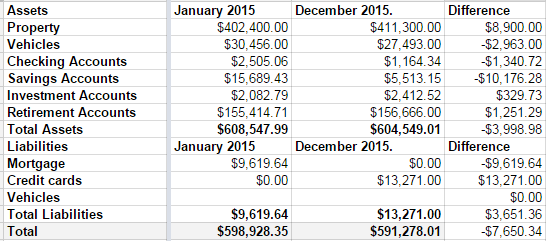- RT @ScottATaylor: Get a Daily Summary of Your Friends’ Twitter Activity [FREE INVITES] http://bit.ly/4v9o7b #
- Woo! Class is over and the girls are making me cookies. Life is good. #
- RT @susantiner: RT @LenPenzo Tip of the Day: Never, under any circumstances, take a sleeping pill and a laxative on the same night. #
- RT @ScottATaylor: Some of the United States’ most surprising statistics http://ff.im/-cPzMD #
- RT @glassyeyes: 39DollarGlasses extends/EXPANDS disc. to $20/pair for the REST OF THE YEAR! http://is.gd/5lvmLThis is big news! Please RT! #
- @LenPenzo @SusanTiner I couldn’t help it. That kicked over the giggle box. in reply to LenPenzo #
- RT @copyblogger: You’ll never get there, because “there” keeps moving. Appreciate where you’re at, right now. #
- Why am I expected to answer the phone, strictly because it’s ringing? #
- RT: @WellHeeledBlog: Carnival of Personal Finance #235: Cinderella Edition http://bit.ly/7p4GNe #
- 10 Things to do on a Cheap Vacation. https://liverealnow.net/aOEW #
- RT this for chance to win $250 @WiseBread http://bit.ly/4t0sDu #
- [Read more…] about Twitter Weekly Updates for 2009-12-19
Net Worth and other stuff

This was not a good year for our net worth.
Over the summer, we remodeled both of our bathrooms. At the same time.
1 out of 10: Don’t recommend.
We love the bathrooms, but–as with any project–it went over budget. Sucks to be us.
Then, towards the end of the year, we decided to push hard and pay off our mortgage in 2015. Part of doing that meant paying the credit card off slower than we’d like. It wasn’t the best long-term decision, but we’re mortgage-free now.
Those decision, coupled with a small slump in our investment accounts means we are worth $7650 going into 2016 than we were at the start of 2015.
Disappointing.
I’m also disappointed that our credit card discipline slipped last year.
New plan: No debt before tax day. Every cent of Linda’s paycheck, every cent of my monthly bonus checks, and every cent of any extra money we make is going into the remaining credit card debt. My math says that last debt will die on April 1st.
Then we get to talk about what to do with out money when there’s no debt. But never fear, I have a plan. A boring, boring plan.
- We’re going to save for college at a rate we should have started 10 years ago.
- We’re going to max out both of our retirement plans.
- We’re going to take some nicer family vacations.
- We’re going to buy a pony.
So not that boring.
And when our kids all decide to become certified sign-spinners, we’ll have a huge nest-egg in the college fund savings account to spend on lottery tickets.
Make Extra Money Part 2: Niche Selection
If you want to make money, help someone get healthy, wealthy or laid.
This section was quick.
Seriously, those three topics have been making people rich since the invention of rich. Knowing that isn’t enough. If you want to make some money in the health niche, are you going to help people lose weight, add muscle, relieve stress, or reduce the symptoms of some unpleasant medical condition? Those are called “sub-niches”. (Side question: Viagra is a sub-niche of which topic?)
Still not enough.
If you’re going to offer a product to help lose weight, does it revolve around diet, exercise, or both? For medical conditions, is it a way to soothe eczema, instructions for a diabetic diet, a cure for boils, or help with acne? Those are micro-niches.
That’s where you want to be. The “make money” niche is far too broad for anyone to effectively compete. The “make money online” sub-niche is still crazy. When you get to the “make money buying and selling websites” micro-niche, you’re in a territory that leaves room for competition, without costing thousands of dollars to get involved.
Remember that: The more narrowly you define your niche market, the easier it is to compete. You can take that too far. The “lose weight by eating nothing but onions, alfalfa, and imitation caramel sauce” micro-niche is probably too narrowly defined to have a market worth pursuing. You need a micro-niche with buyers, preferably a lot of them.
Now the hard part.
How do you find a niche with a lot of potential customers? Big companies pay millions of dollars every year to do that kind of market research.
Naturally, I recommend you spend millions of dollars on market research.
No?
Here’s the part where I make this entire series worth every penny you’ve paid. Times 10.
Steal the research.
My favorite source of niche market research to steal is http://www.dummies.com/. Click the link and notice all of the wonderful niches at the top of the page. Jon Wiley & Sons, Inc. spends millions of dollars to know what topics will be good sellers. They’ve been doing this a long time. Trust their work.

You don’t have to concentrate on the topics I’ve helpfully highlighted, but they will make it easier for you. Other niches can be profitable, too.
Golf is a great example. Golfers spend money to play the game. You don’t become a golfer without having some discretionary money to spend on it. I’d recommend against consumer electronics. There is a lot of competition for anything popular, and most of that is available for free. If you choose to promote some high-end gear using your Amazon affiliate link, you’re still only looking at a 3% commission.
I like to stick to topics that people “need” an answer for, and can find that answer in ebook form, since I will be promoting a specific product.
With that in mind, pick a topic, then click one of the links to the actual titles for sale. The “best selling titles” links are a gold mine. You can jump straight to the dummies store, if you’d like.
Of the topics above, here’s how I would narrow it down:
1. Business and Careers. The bestsellers here are Quickbooks and home buying. I’m not interested in either topic, so I’ll go into “More titles”. Here, the “urgent” niches look like job hunting and dealing with horrible coworkers. I’m also going to throw “writing copy” into the list because it’s something I have a hard time with.

2. Health and Fitness. My first thought was to do a site on diabetic cooking, but the cooking niche is too competitive. Childhood obesity, detox diets and back pain remedies strike me as worth pursuing. I’m leaning towards back pain, because I have a bad back. When you’ve thrown your back out, you’ve got nothing to do but lie on the couch and look for ways to make the pain stop. That’s urgency.
3. Personal Finance. The topics that look like good bets are foreclosures and bankruptcies. These are topics that can cost thousands of dollars if you get them wrong. I hate to promote a bankruptcy, but some people are out of choices. Foreclosure defense seems like a good choice. Losing your home comes with a sense of urgency, and helping people stay in their home makes me feel good.
4. Relationships and Family. Of these topics, divorce is probably a good seller. Dating advice definitely is. I’m not going to detail either one of those niches here. Divorce is depressing and sex, while fun, isn’t a topic I’m going to get into here. I try to be family friendly, most of the time. Weddings are great topic. Brides are planning to spend money and there’s no shortage of resources to promote.
So, the niches I’ve chosen are:
- Back pain
- Bankruptcy
- Conflict resolution at work
- Detox diets
- Fat kids
- Foreclosure avoidance
- Job hunting
- Weddings
- Writing copy
I won’t be building 9 niche sites in this series. From here, I’m going to explore effective keywords/search terms and good products to support. There’s no guarantee I’ll find a good product with an affiliate program for a niche I’ve chosen that has keywords that are both highly searched and low competition, so I’m giving myself alternatives.
For those of you following along at home, take some time to find 5-10 niches you’d be willing to promote.
The important things to consider are:
1. Does it make me feel dirty to promote it?
2. Will there be customers willing to spend money on it?
3. Will those customers have an urgent need to solve a problem?
I’ve built sites that ignore #3, and they don’t perform nearly as well as those that consider it. When I do niche sites, I promote a specific product. It’s pure affiliate marketing, so customers willing to spend money are necessarily my target audience.
How You’re Finding Me
Every once in a while, I like to dig through Google Analytics and see how people are finding this site. Some of the search terms are interesting.
“father of three” mid life crisis
Here’s a free piece of advice. As a father of three, you don’t get to have a mid-life crisis. It’s not allowed. Rather, it’s allowed, but you aren’t allowed to act on it. At a minimum, until your children are out of the house, you need to man up and provide all of the support you possibly can. No sports cars you can’t afford and no 22 year old hardbodies. Be there for your kids.
“payday loans” which accepts guest posts
Payday loan marketing. Just go away. You aren’t running a guest post here.
“slow carb” hungry all the time
You’re doing it wrong. If you are hungry, eat more bacon. Or beans. Beans fill you up longer.
$1000000 business idea
Ideas are the easy part. Execution makes you a millionaire.
articles on why appearance shouldn’t matter?
Appearances do matter, and always will. Your appearance is what makes the initial impression when you meet someone new. You don’t have to be a model, but basic grooming and fashion sense is necessary. Take this with a grain of salt. I’ve got a week’s growth of a beard and I wear a different plaid, button-down shirt every day.
are push ups supposed to be hard
Only the first 50. After that, I kind of go on blissed-out autopilot. If you can do 100 pushups, you can probably do 200.
acceptable place to put tattoo
If you wear clothes there, you can put a tattoo there. Visible tattoos are called “job stoppers” for a reason. If you put a tattoo on your face, the only job you qualify for is “drug dealer’s girlfriend”. Or possibly prison janitor.
burning bridges with toxic people
If you must burn bridges, filling them with toxic people first isn’t a bad idea.
candied pork butt
Rule 34: If it exists, there is porn of it. Interesting side story: while double-checking the rule number, I stumbled across My Little Ponies doing things they never advertise on the box.
cut my wife’s hair
I did this once. Pro tip: In the back, at the bottom, cut small chunks and leave them longer than you think they should be. You can always cut more, but uncutting hair is really hard.
f***** on the roadside by your mechanic
He probably deserves a tip for that.
girls fart for money and girls live farts
See the bit about the pork butt, remove the funny, and…ewww.
how to be a successful debtor
I recommend starting by paying your bills. When the debts are gone, you win. Success!
i ate bacon on slow carb diet
So did everyone else, sweetie. It’s the biggest draw to the slow carb diet.
in memory of pets tattoos
When I get a pet, I get it with the understanding that I’m going to outlive it. The day I bring it home, some small part of me is preparing for the day when I have to dig a hole in my backyard. Tattooing that day? Not gonna happen.
thickening felt behind testicle
Why are you on google? Go to the doctor. Please?
Interesting. Between girls farting and my post about being well-trained, there is a significant amount of fetish traffic coming through here. Maybe I need to explore a new advertising strategy.
What Is Your Binary Options Strategy?
 When you are just entering the world of binary options trading or investing, you may be on the receiving end of a lot of advice. It is not uncommon to hear people tell you to implement different gambling strategies because binary options are based on chance more than anything else. You will also hear a lot of advice from those who say there are many good ways to develop an effective strategy using indicators and market signals. Some will insist that with proper analysis of market data, a solid strategy can be developed too.
When you are just entering the world of binary options trading or investing, you may be on the receiving end of a lot of advice. It is not uncommon to hear people tell you to implement different gambling strategies because binary options are based on chance more than anything else. You will also hear a lot of advice from those who say there are many good ways to develop an effective strategy using indicators and market signals. Some will insist that with proper analysis of market data, a solid strategy can be developed too.
Are they all correct? Interestingly enough, the answer is yes. The reason for this is simple, and as one expert writes, “there is no such thing as a perfect strategy for every trader. There is only a best strategy for each individual trader.” Thus, your strategy has to be shaped around a few things:
- Your willingness and ability to follow your chosen strategy.
- Your personality. For instance, are you restless if you are taking the safe route or a higher risk strategy?
- Your budget and goals,
Identifying the answers to these questions is the first step to formulating a strategy. You should also understand that the winning percentage of most strategies will be somewhat constant, but the total number of successful trades varies on an individual basis and is based entirely on the strategies used.
For instance, some investors want a high percentage of winning trades and are more comfortable with risk averse trading. Others are ready to take more risk and are entirely comfortable winning fewer trades if the returns on winning trades are dramatically higher. This enables them to implement higher risk trades. The interesting thing about strategies and the kinds of trades they generate is that they are all built from the same data.
The Data of Strategy
For example, almost all strategies will look at issues like market trends, trading trends, highs and lows, reversals, and various kinds of indicators. The reason that high and low trends pay off in strategy development is simple: binary options trading applies to whether or not an asset rises above a strike price or doesn’t. It is the proverbial “yes or no” part of the proposition and analysis for either outcome pays off.
As an example, a lot of risk-averse investors will look for breakouts. They use these for trend line investing, which can be as brief as sixty seconds to a day, but can be used to coordinate investing in the direction of a short trend. Although this seems complex, it really is not. The key is that analysis cannot be broad and across all available markets. Instead, focused analysis on a specific area will allow even a novice investor to analyze for a breakout and then invest in binary options accordingly.
Just being able to detect a reversal or a downward trend over the course of a day can yield a very rewarding investment. The key is to understand your strategy based on your budget, personality, and your ability to stick with the strategy, even if it does not yield immediate success. When you do this, and use the right tools for analysis, you can create an effective strategy that brings you closer to your goals.
This is a guest post.
Bribes vs Rewards

What’s the difference between a bribe and a reward? It’s a question that has been heavily on my mind lately. As a father of three–1, 3 and 10–motivating children occupies a lot of my thoughts. Is it possible to motivate a child and reward good behavior without resorting to a bribe?
First, let’s look at the definitions:
bribe n.
1. Something, such as money or a favor, offered or given to a person in a position of trust to influence that person’s views or conduct.
2. Something serving to influence or persuade.
re·ward n.
1. Something given or received in recompense for worthy behavior or in retribution for evil acts.
2. Money offered or given for some special service, such as the return of a lost article or the capture of a criminal.
3. A satisfying return or result; profit.
4. Psychology: The return for performance of a desired behavior; positive reinforcement.
In my mind, a reward is given either as a goal for planned activity or a surprise for good behavior. When used for surprises, it should never be common enough to be expected. If a child is only behaving because she is expecting a reward, it is bribed behavior. She should always be surprised to get the reward.
Using a reward for goal setting is no different than collecting a paycheck. Is my company bribing me to do the work I do every day? They plan to reward or compensate me for the work I plan to do for them. While that my be blurring the line between compensation and rewards, it is valid. My future paycheck is the motivation for my current work.
Bribes, on the other hand, are reward for bad behavior. If my three-year-old is throwing a tantrum in the grocery store and I promise her candy to stop, I have just taught her that the “reward” for a public tantrum is candy. This is reinforcing negative behavior, which will only escalate in the future. If a temper tantrum earns a candy bar, what will she get for hitting Mommy with a frying pan?
The line is further blurred by preemptive bribes. If I tell my children there will be candy when we get home if they behave in the store, it’s still a bribe. Promising dessert if my son cleans his room is a bribe.
So what is the difference?
Bribes reward negative behavior. Whether that is actual behavior or anticipated behavior, bribes provide a reward for it. If you use a treat to end or preempt bad actions, you are bribing your child.
Rewards celebrate positive behavior. A promised treat for going beyond expectations or a surprise for excellent behavior is a reward. It should never become common, or the child will discover that withholding the positive behavior will generate promises of larger rewards. The goal is to reinforce the good to encourage positive behaviors even when there is no likelihood for reward.
For example, my son’s school is part of a reading contest. Over a two month period, if the students read 500 pages outside of school, they will get tickets to a basketball game. If they are in the top three for pages read, they will get personalize jerseys and on-court recognition. My son did the math and was reading enough to surpass the 500 page goal, but not enough to get into the top three. I offered a prize if he made it to 2500 pages. In my opinion, that’s a reward. He was already going beyond the requirement. I have provided motivation to push himself beyond what he thinks he can do. That’s positive reinforcement of good behavior.
On the other hand, when my eight-year-old was refusing to eat dinner, we offered a cookie for dessert if she ate well. That’s reinforcing negative behavior by giving a reward for misbehaving. A bribe.
Rewards are positive responses to positive behavior to motivate future good behavior. Bribes are rewards for negative behavior, real or anticipated, that only serve to encourage more bad behavior in the future.



